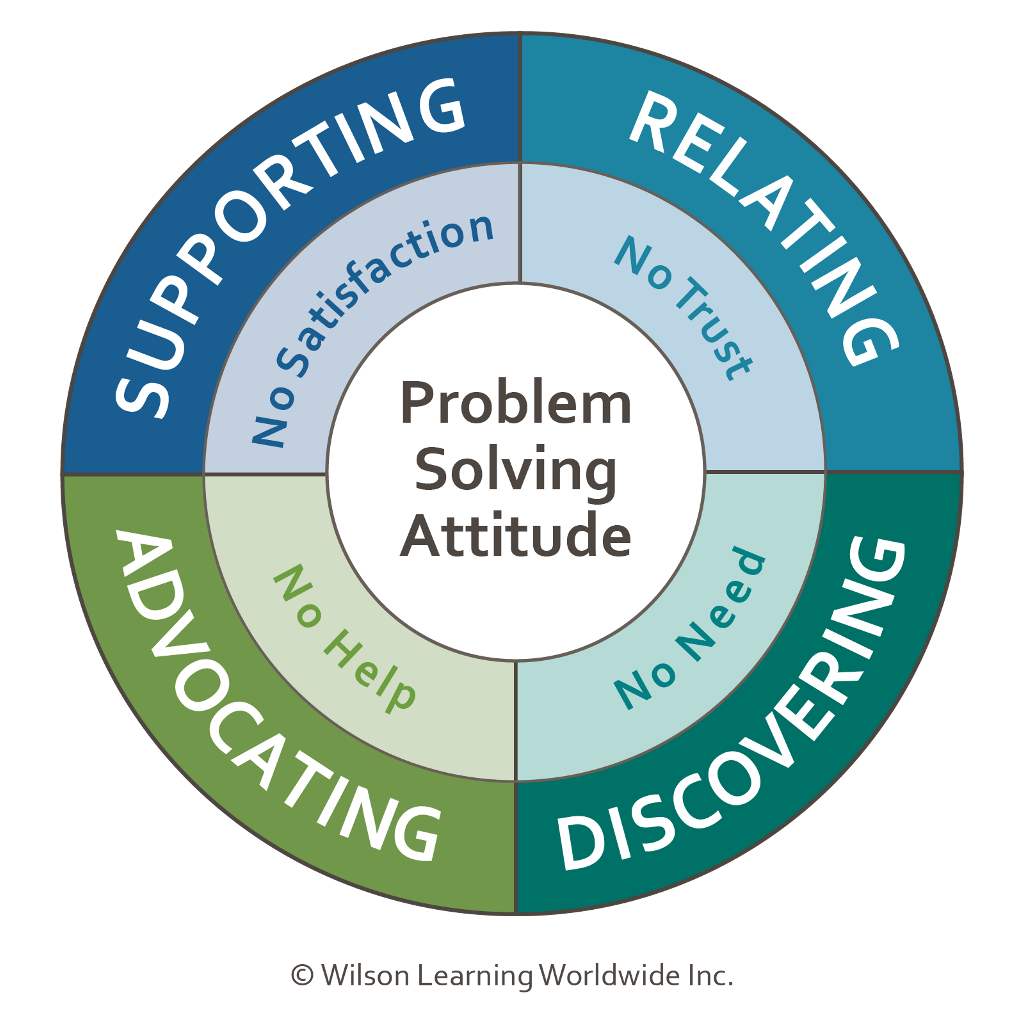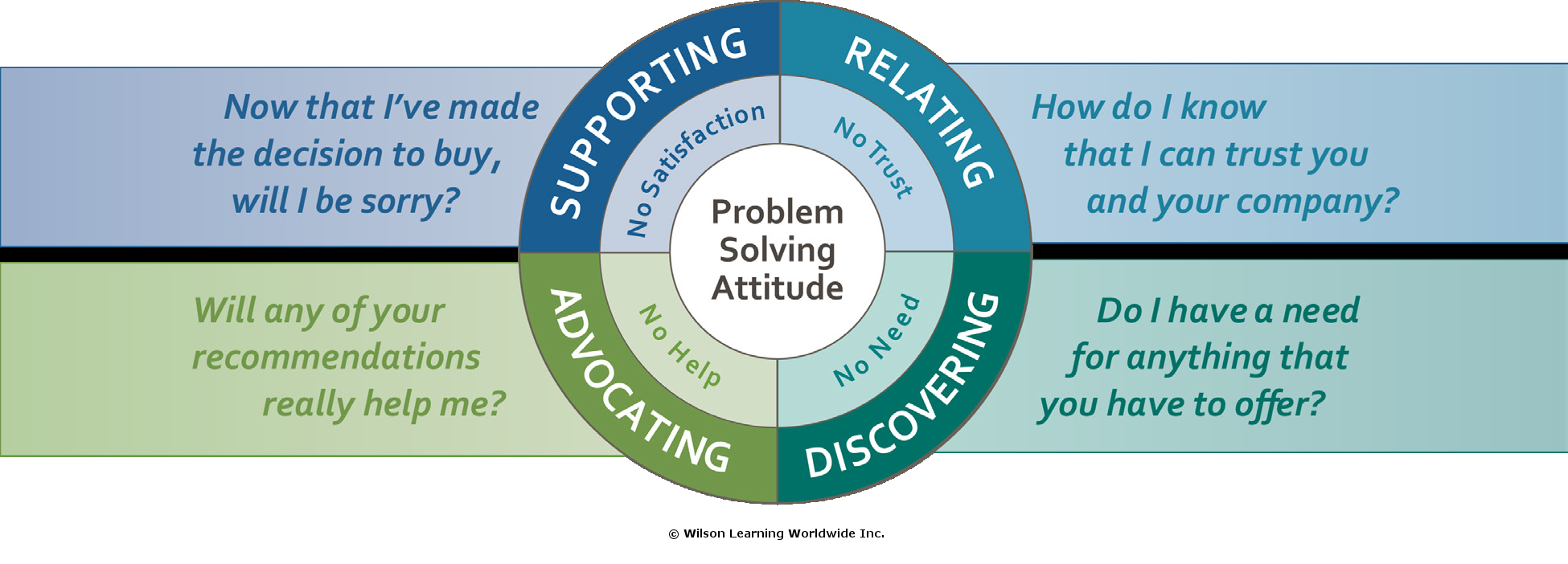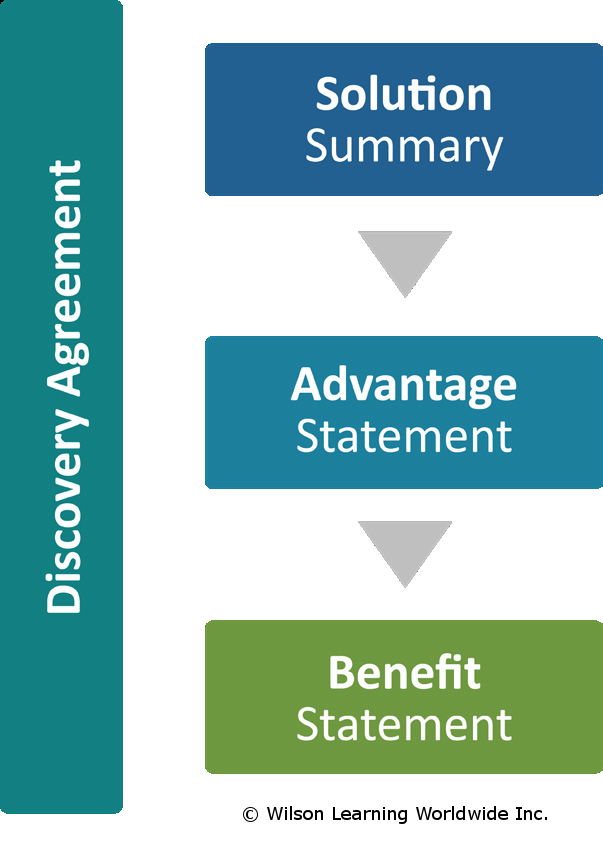Selling virtually
Everything has changed, yet nothing has changed

It would be an understatement to say that this year has brought a torrent of change. In these times, it is easy to think, “Everything has changed. The skills I’ve learned and used successfully in the past are useless. The old ways are no longer effective. Business will never be the same again!”
But now, and perhaps more than ever, it is valuable to appreciate the wisdom of this famed quote:
“In matters of style, swim with the current; in matters of principle, stand like a rock.”
Success comes from recognizing what has changed and what has not.
Nothing Has Changed: The Principles of the Counsellor Approach

Wilson Learning pioneered the Counsellor Approach to selling over 50 years ago. At the time, it was considered novel, even preposterous, to some. But those who adopted it discovered an important fact: it worked—both for the buyer and for the salesperson. This true win-win concept has been at the heart of Wilson Learning since the beginning. We, as salespeople, get what we want when our customers get what they want.
Customers buy for their reasons, not ours. The job of the salesperson is to help a customer buy. Salespeople can do this by helping the customer overcome the four barriers to buying:
- No Trust. “How do I know that I can trust you and your company?”
- No Need. “Do I have a need for anything that you have to offer?”
- No Help. “Will any of your recommendations really help me?”
- No Satisfaction. “Now that I’ve made the decision to buy, will I be sorry?”
The rock-solid principles of the Counsellor Approach have not changed, and neither have the Counsellor selling skills for overcoming the four barriers to selling.
Everything Has Changed: The Virtual Sales Environment
What has changed is the environment in which a salesperson needs to apply the Counsellor Approach—virtually.
Effectively executing Counsellor selling skills in the virtual sales environment is now highly dependent on a number of things:
- The salesperson’s understanding of and leveraging of technology
- The salesperson’s ability to apply the right technology at the right time
- The salesperson’s situational awareness of the virtual image he or she is projecting to the customer
Technology has long played a supporting role in the sales process. Of late, the use of technology has been accelerated to a strategic role due to the rarity of face-to-face interactions.
So what hasn’t change?
Stand like a Rock, Swim with the Current
The bedrock Counsellor selling skills—Relating, Discovering, Advocating, and Supporting—drive the principles of the Counsellor Approach and continue to equip salespeople to deal with “The Four No’s” for turning suspects into prospects and prospects into customers.
Style in the present digital current requires salespeople to be agile in planning around technology and choosing the best way for messaging in a particular opportunity. They must consciously choose the best way to communicate from a wide range of digital communications, including video conference, conference call, mobile chat, email, text, or social media.
The act of planning and the discipline needed to prepare for a successful sales call is not new. Going forward, planning is simply different. Let’s consider how Counsellor selling skills can be best utilized in virtual selling while enhancing the approach with the proper use of technology.

Relating: Credibility + Empathy = Trust
Getting the customer past the No Trust barrier lies in the salesperson’s ability to build credibility and demonstrate empathy.
In the face-to-face selling world, the skills for Relating were relatively straightforward. Salespeople could go to a client site, look at the environment, observe how people were acting and dressing, and accommodate to the customer’s external expectations. In a face-to-face call, salespeople demonstrated their knowledge of their product or service portfolio and shared insights into their customer’s industry.
Today, credibility is more fragile. The moment the salesperson fails to seamlessly navigate digital tools like screen or document sharing in a virtual sales meeting, credibility is damaged. Now working from a virtual office, background clutter and distractions in the video shot can also quickly destroy the salesperson’s sense of professional credibility.
Virtually, propriety is communicated by the salesperson’s demonstrated skills, or lack of, to flawlessly execute a technology platform and their awareness of what the virtual setting communicates to the customer.
How a salesperson demonstrates empathy for the customer has also changed in a couple of critical ways:
- The need to establish personal and business empathy is still relevant. However, now the salesperson also needs to address the stress created by today’s virtual work environment and the customer’s own tension around navigating new technology.
- In face-to-face meetings, empathy could be established at the beginning; in a virtual selling environment, it becomes necessary to check for engagement multiple times.
Establishing Trust Prior to the Sales Call
If the salesperson’s approach to establishing trust begins with the first time on a video conference call with a buyer, chances are a degree of trust has already been lost. If, however, the salesperson has connected with customers through social media, positioning him or herself as knowledgeable in the customer’s industry, they are a step ahead. Bottom line? Salespeople must leverage the multiple, ever-evolving digital applications for communicating virtually.
Discovering: Trust + NO NEED = NO SALE
Just like Relating skills, the use of Discovery skills in a virtual environment can enhance the customer’s experience or get in the way of good Discovery.
A key challenge for Discovery in a virtual environment is that it can quickly start to feel like an interrogation rather than a dialogue if the salesperson isn’t mindful of the new environment.
A virtual environment can feel very open and public and, as a result, rapid-fire questions, looking away from the screen to take notes, or asking the customer for sensitive information can get in the way of establishing a discussion and creating a dialogue that is essential for uncovering the customer’s needs and expectations.

In virtual Discovery, the Counsellor Salesperson needs to:
- Make sure the customer is comfortable with the questions. Sending a list of questions ahead of time allows the customer to process the questions in advance, making it seem less potentially confrontational.
- Take notes on the screen and invite the customer to use annotation tools to do the same.
- Frequently summarize and ask for agreement from the customer on needs and priorities.
Advocating: Building the Solution Together
Advocating is about linking Discovery of the customer’s needs to the characteristics of a solution and allows the customer to see what life would be like using the salesperson’s product or service.
In the virtual Advocating environment, it is important to find a way for the customer to “touch” the solution. Of course, if this is a digital product or service, it is easy to conduct a demo. For physical products or less tangible services, this can be more difficult.
Cycling back to the results from Discovery as each advantage and benefit is presented helps keep the customer involved and engaged. Otherwise, Advocating begins to feel like a technical lecture rather than a solution to the customer’s problem.
The key is to use Counsellor skills to make the customer a partner in the presentation of the solution. In a virtual setting, this presentation can actually be enhanced through the use of collaborative features on a technology platform.
Supporting Trust + Need + Help + No Satisfaction = No More Sales
Technology already plays a central role in executing Supporting skills, but new challenges arise when support is addressed mostly or completely virtually.
A key issue is that customers often do not feel comfortable expressing dissatisfaction virtually. So, the salesperson might think the customer is satisfied or indifferent when he or she really is dissatisfied.
It is also important for salespeople to make their support feel more “real” to their customers. A best practice is to formally introduce the support team via a video call to explain roles and responsibilities, giving a face to a name.
Nothing has changed.
Everything has changed.
The principles of the Counsellor Approach still reflect the customer buying process and should drive the Counsellor Salesperson’s sales process. Salespeople must also pay attention to, and intentionally use, virtual selling technologies and tools to adapt to today’s sales environment.
What may feel cumbersome today will, in short order, become more comfortable as everyone adjusts to selling in this new reality. Knowing what to adapt to, and what to hold on to as time-tested, enduring Counsellor Approach principles, will separate the great salespeople from the others.
To learn more, contact Wilson Learning Worldwide | Phone: +44.1494.678.121 | Email: info@wilsonlearning.co.uk









 Please complete this form to download Selling virtually | Everything has changed, yet nothing has changed.
Please complete this form to download Selling virtually | Everything has changed, yet nothing has changed.



